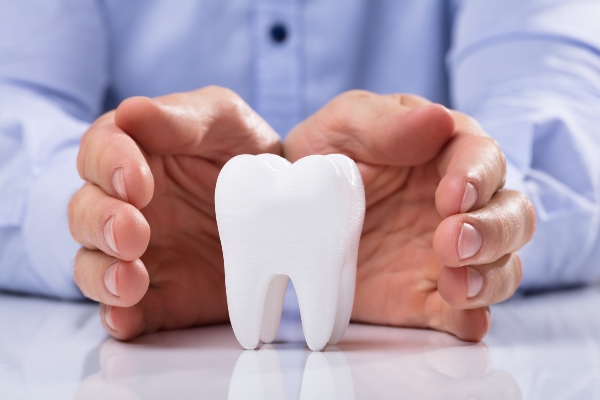How a Dental Filling Can Protect Your Teeth

A dental filling is most often used to treat cavities. If a patient has a cavity, the dentist removes decay from the tooth and fills the area. Likewise, the filling material can repair cracked and broken teeth. There are several materials available for dental fillings. Materials include porcelain, gold, silver amalgam, and composite resin.
You may have some say in what kind of material is used in your filling. Your dentist can help recommend the options that would work well in your situation but depending on your insurance coverage, you may be limited in what your options are. In most cases, you should expect to be in the dentist's office for about an hour for the procedure.
How are dental fillings a protective measure?
Dental fillings are a procedure used to address specific problems with the teeth. Generally, dentists use fillings if the patient has one of a variety of conditions. While a filling may be a measure to fix a problem, it can also prevent further issues. When it comes to oral health problems, most problems only become worse over time. Dental fillings allow patients to take proactive measures to protect the teeth from further damage.
Fillings for cracked and broken teeth
There are various reasons why a patient may have cracked or broken teeth. Teeth can break due to falls, accidents, biting into a hard piece of food, sports injuries, and many more ways. When a patient has a crack or breaks in the tooth, it may not initially cause pain or present as more than a cosmetic issue. Unfortunately, some patients may avoid the dentist despite the need for prompt care.
To leave a fractured or broken tooth untreated can lead to an infection of the pulp. Over time, the damage becomes worse, and the patient may lose the tooth or require a root canal. Fillings protect the teeth by sealing the crack so bacteria cannot enter the tooth.
Fillings for teeth grinding
Bruxism is the other word for teeth grinding. When patients arrive at the dental exam, the dentist looks for signs of grinding. To evaluate the state of the patient's teeth, the dentist may look for tenderness in the jaw muscles, dental abnormalities, and damage to the teeth and underlying bone.
Patients who have damage from bruxism can get a dental filling to protect their teeth from further damage. If tooth grinding continues, the teeth can begin to chip and break. Fillings provide strength and protection to the tooth's structure.
Fillings for tooth decay
Tooth decay occurs when plaque forms on the teeth and creates acid that wears down the enamel. In the early stages, patients may notice a white spot on the tooth. When left alone, decay progresses and affects the dentin. At this juncture, the patient has a cavity and may require a filling.
When the dentist fills the tooth, it stops the decay. The filling can restore functionality, ease pain, and stop the spread of decay through the particular tooth. Fillings for cavities also strengthen the teeth.
FAQs about dental fillings
What is the recovery from a filling like?
While you should not notice much discomfort following a filling, mild pain and sensitivity to hot or cold foods are common. If these symptoms do not go away within a few days it is a good idea to check with your dentist to make sure there is not an underlying issue causing them
How long do fillings last?
Depending on the material used, fillings should last from 5 to 10 years. Proper care, such as a good daily oral hygiene routine and routine checkups with a dentist, can help a filling stay good for as long as possible.
Conclusion
When dentists recommend a dental filling, they can use various materials according to the patient's preferences or the tooth's condition. Different considerations that may be taken to account include how the material will look in the mouth, the cost of the desired material, and any health concerns, such as allergies to metals, that need to be taken into account. Never be afraid to ask questions during the consultation or before the procedure to make sure you and your dentist are on the same page.
A dentist may use a filling for a variety of conditions that compromise the structure of the tooth. Fillings can be a protective measure when it comes to breaking, grinding, and decay. They are a routine procedure that should not require too much of your time to complete.
Request an appointment here: https://joyfuldentalcare.com or call Joyful Dental Care at (773) 786-9560 for an appointment in our Chicago office.
Check out what others are saying about our dental services on Yelp: Composite Fillings in Chicago, IL.
Related Posts
If you are self-conscious about your smile because of a damaged or chipped tooth, you should know that a dentist can use dental fillings to quickly correct these minor flaws and restore your smile's appearance.Dental filling application is an in-office technique in which dentists use a tooth-colored resin substance to fix minor flaws in the…
A dental filling is subject to wear and tear. Read on to learn about a few signs of a cracked dental filling to watch for. The damaged filling can remain a minor inconvenience, just so long as you see a dentist as soon as you discover the problem.Fillings have reasonably long lifespans, with some filling…
Gum recession is one of the many conditions that can be treated with the use of composite fillings. Receding gums can reduce confidence in the appearance of a person's smile and increase the risk of tooth sensitivity and decay. Fortunately, with treatment, this condition can often be stopped or reversed.Gum recession occurs when the gums…
Learning about your options for tooth fillings is a great idea. No longer do you have to settle for the traditional metal fillings; instead, you now have the ability to choose the type of tooth filling you want for treating your tooth cavities. According to the American Dental Association, when it comes to having a…



